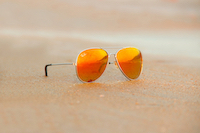July is UV Safety Month. Don’t forget that UV radiation can harm your eyes.
UV exposure has been linked to several eye conditions:
• Cataracts – a clouding of the natural lens in the eye
• Macular Degeneration – a disease that causes damage to the central part of the retina responsible for a majority of our vision
• Pinguecula – a yellowish, elevated thickening of the conjunctiva on the white part of the eye
• Pterygia – a wedge-shaped elevation that starts on the white part of the eye and eventually grows onto the cornea where it can affect one’s vision
• Photokeratitis – essentially a “sunburn” of the cornea
Thus, UV protection is very important. When selecting sunglasses, you want them to block 100 percent of the UV rays and most of the high-energy visible (HEV) radiation (“blue light”). Not only is lens selection important, but you also want the proper frame. A frame that is close fitting or wraparound will provide the best protection because they prevent stray light from getting around the periphery of the sunglass lenses.
All who enjoy time outdoors are at risk of eye problems from UV exposure. There are a number of factors that contribute to the risk of damage:
• Time of day – exposure levels are greatest when the sun is highest in the sky, 10am – 2pm
• Geographic location – UV levels are greater the closer one is to the equator and when near reflective surfaces like water, snow and sand
• Altitude – exposure levels are increased at higher altitudes
• Medications – certain medications, including tetracyclines, sulfa drugs, birth control pills, diuretics and tranquilizers, increase the body’s sensitivity to UV levels
A common misconception is that cloud cover significantly reduces UV levels. Actually, one’s exposure can be quite high on cloudy, overcast days due to the fact UV light is able to penetrate clouds.
It is especially important to protect the eyes of children from UV exposure. This is because the risk of damage is cumulative, meaning the risk of damage increases as one spends more time outside over the course of their lifetime.
If you have more questions regarding risks associated with UV exposure or anything else eye related, call Summit Eye Center at (816) 246-2111 or email
The following is another good reference regarding UV exposure and the eye: https://www.aao.org/eye-health/tips-prevention/sun.